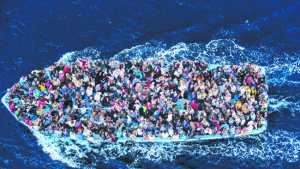Global migration crises come under scrutiny
 The growing numbers of migration crises facing the international community are symptoms of a long line of brutal conflicts and rights violations, according to the United Nations High Commissioner for Human Rights.
The growing numbers of migration crises facing the international community are symptoms of a long line of brutal conflicts and rights violations, according to the United Nations High Commissioner for Human Rights.
“Political turbulence, repression, violence and war have become so widespread that they impel many millions of the world’s people to risk their lives to find a place of relative safety,” UN human rights chief Prince Zeid Ra’ad Al Hussein said this week.
“Migration is the symptom, the cause is despair, after repeated human rights violations have stripped an individual of all hope of justice and dignity,” he told the opening of the UN Human Rights Council’s June session.
Meanwhile, global human rights group Amnesty International issued a report saying the current approaches to dealing with the world’s refugee problems were failing while calling for a shift in how refugee crises are addressed.
In a report, titled ‘The Global Refugee Crisis: A Conspiracy of Neglect’ and issued for World Refugee Day, Amnesty said the global refugee crisis was worsening. It called for a system that protects refugees and shares the burden among countries.
“The international community should hold a summit on the refugee crisis and develop robust refugee systems. Countries must be committed to saving the lives of refugees in distress and combat trafficking, fight xenophobia and establish a global refugee fund,” the group said.
Amnesty said that for the first time since World War II, the number of those forcibly displaced from their homes exceeded 50 million in 2013. This week the figure ticked over to 60 million displaced people, said the UNHCR in its annual Global Trends Report.
This week the UN Human Rights Council will hold important and potentially seminal discussions on the rights of migrants.
“Your leadership on this issue will be vital, particularly in terms of the multiple crises regarding migrants en route to Europe, Southeast Asia and Australia,” Prince Zeid told the Council members.
His comments came as surging numbers of migrants and refugees have been risking their lives on rickety boats to reach safety in different parts of the world.
More than 100,000 people have made the perilous journey across the Mediterranean to Europe so far this year, and about 1,800 have drowned trying.
Southeast Asia’s migrant crisis began at the start of May, with thousands from Bangladesh and Myanmar’s persecuted Rohingya minority trapped at sea.
Since then, around 4,500 of them have returned to shore, but the UN estimates around 2,000 others are still on the water.
“I am particularly concerned about the persecution of the Rohingya community in Myanmar,” Prince Zeid.
“I believe the time has come for the Human Rights Council to probe more deeply into the nature and scope of these violations, and how they might more effectively be addressed.”
Myanmar refuses to recognise the majority of its Rohingya as citizens and places a raft of restrictions on them, such as family size, movements and access to jobs.
In recent years tens of thousands of Rohingya have left, fleeing on often deadly voyages across the Bay of Bengal at the hands of ruthless people-smuggling and trafficking networks.
Many diplomats also voiced concern about the surging waves of desperate people risking their lives to reach safety.
“The increase in migration flows, smuggling and trafficking of human beings, and the associated human rights abuses are global phenomena of rising concern,” Latvian ambassador Raimonds Jansons said on behalf of the European Union, which requested the pending debate on the issue.
In its report, Amnesty says more than half of the Syrian population is displaced, making the situation one of the world’s biggest ever refugee crises. The crisis is the result of years of fighting between government forces and rebels, as well as advances by Islamist militant groups.
Because of the Syrian refugee crisis, Amnesty says Syrian refugees now account for one in every five people in Lebanon. It says the United Nations appeal for Syrian refugees has been only 23 percent funded.
In Africa, Amnesty says people escaping violence in South Sudan, the Central African Republic, Nigeria and Burundi are adding to the continent’s longstanding refugee populations from Somalia, Ethiopia, Sudan and the Democratic Republic of Congo. Amnesty says appeals for humanitarian aid for African refugees are severely underfunded.
The report looks at refugees and migrants who are risking their lives to cross the Mediterranean Sea to reach Europe, leading to hundreds of deaths.
Amnesty said one reason for the increased deaths was the European Union’s decision to carry out more limited naval operations to deal with the migrants in the Mediterranean.
Amnesty also focused on the plight of refugees and migrants in Southeast Asia, where in May of this year fishing boats crammed with people from Myanmar and Bangladesh were forced out to sea by Thailand, Malaysia and Indonesia.
It says those people were left without care or supplies for a week before the Philippines, Indonesia and Malaysia offered to take them in.
The rights group says people smugglers and human traffickers are blamed in Europe and Southeast Asia, but governments must still provide protection to refugees.
Helen Matovu-Reed
AMES Staff Writer












